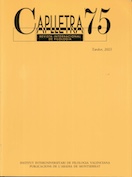The female characters in popular narratives about pirate raids: between fear and courage
DOI:
https://doi.org/10.7203/caplletra.75.26832Keywords:
pirate raids, legends, captured women, popular narrative, captives Abstract
Abstract
Over the centuries, pirates and corsairs devastated the Mediterranean Sea and its shores. Ships full of armed men willing to steal goods and kidnap people to be sold as slaves or rescued often arrived in the Balearic Islands. The islanders had to develop surveillance and protection strategies. In a predominantly male environment, women were also victims of attacks and kidnappings. This article examines popular narratives dealing with this topic and specifically points to the role of women. It is divided into three parts: women’s self-defence, abducted women, and the setbacks of enslaved women who develop strategies to survive and free themselves to return to the islands. I come to the conclusion that women play a very active role in these stories, portraying their courage and reactive capacity in the face of hostility. With less physical strength and without conventional weapons, women put their imagination, skill and courage into play to overcome difficulties.
 Downloads
Downloads
Downloads
Published
How to Cite
-
Abstract201
-
PDF (Català)259
Issue
Section
License
Authors submitting work to Caplletra for publication must be the legitimate holder of the usage rights. Legitimacy for the purposes of publishing the work must also include images, tables, diagrams and any other materials that may complement the text, whether they are the author of such material or not.
Copyright: on publishing their work in the journal, the author grants Caplletra. Revista Internacional de Filologia usage rights (reproduction, distribution and public communication) for both the paper printed version and for the electronic version.
All work published in Caplletra is covered by the Creative Commons license type Attribution-NonCommercial-NoDerivatives 4.0 (CC BY-NC-ND 4.0).
RESPONSABILITY
Caplletra. Revista Internacional de Filologia does not necessarily identify with the points of view expressed in the papers it publishes.
Caplletra. Revista Internacional de Filologia accepts no responsibility whatsoever for any eventual infringement of intellectual property rights on the part of authors.






